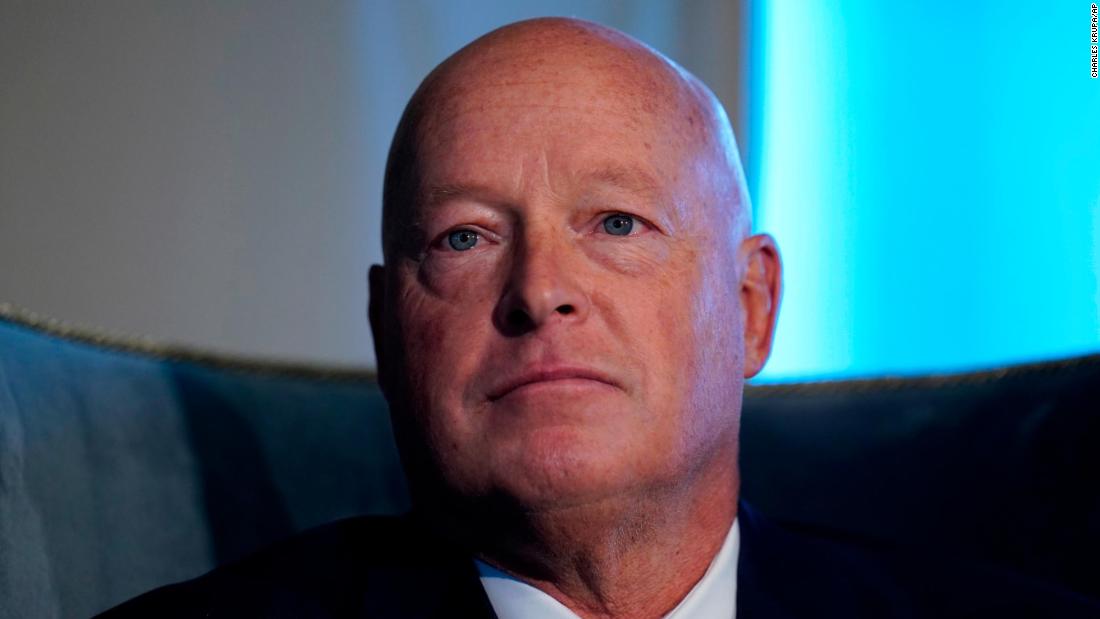Disney shows off its post-Iger politics - 5 minutes read

New York
CNN Business
—
Disney’s CEO transition from Bob Iger to Bob Chapek marked a shift from an outspoken, famous CEO with political ambitions, to a largely unfamiliar name whose politics remain a mystery. This week, we got a glimpse at how Chapek’s Disney might respond to the world’s tumultuous political climate.
On Monday, Chapek spoke about, but did not condemn, Florida’s controversial “Don’t Say Gay” bill, saying that corporate statements are counterproductive and undermine “more effective ways” to implement change.
That’s a very different response from Iger’s, who was vocal about his opposition to the bill, and who tweeted in February that it would “put vulnerable, young LGBTQ people in jeopardy.”
Chapek’s statement marked a tonal shift for the most influential and powerful media company – and could signal a change in how Disney will address political and social issues going forward.
Iger’s politics were well known in Hollywood. The former CEO was a registered Democrat (he became Independent in 2016) and he famously flirted with running for president.
Historically, Disney has been hyper-focused on its reputation as a family-friendly company that offers products for everyone and all ages. Cultural firestorms — which could alienate consumers on any side of the political spectrum — were not something that the company actively sought out.
Still, Disney
(DIS) took stands on several political issues, and Iger and Disney
(DIS) waded into more political waters during the Trump Administration.
“Before the Trump presidency, who could have imagined that the Walt Disney Company would find itself at the fiery center of the American political debate?” Jim Rutenberg, the The New York Times’ media columnist at the time, wrote in 2017. “I told him I had never seen Disney, or a Disney chief executive, so deep in the political mix.”
Iger took stances that put him and Disney in the middle of culture wars.
When ESPN’s Jemele Hill called President Trump a “white supremacist” in 2017, the White House called for Hill to be fired. ESPN is owned by Disney. Iger declined to do so, later explaining at a Vanity Fair Summit that the company needed to “take into account what other people at ESPN were feeling at this time and that resulted in us not taking action.”
And Iger most notably took a stand when he told Reuters in 2019 that it would be “very difficult” for the media company to keep filming in Georgia if that state’s proposed a new abortion law, which would ban abortions if a fetal heartbeat could be detected, took effect. (The law was passed, but was blocked in 2020.)
We’ll never know how Iger would have reacted to the Florida bill as Disney CEO since he stepped away from the company in December. He stepped down as CEO in February of 2020.
However, if Chapek’s comments about the “Don’t Say Gay” bill are any indication, Chapek and Disney’s non-political stance will be a departure from Iger’s tenure.
In response to Florida’s “Don’t Say Gay” bill, which would ban educators from discussions about sexual orientation and gender identity in classrooms, Chapek said that he and Disney’s leadership “unequivocally stand” with LGBTQ+ employees.
He added that the company, which employs over 75,000 people in Florida, is committed to inclusivity. However, he did not take a direct stand against the bill, noting that corporate statements are “often weaponized by one side or the other to further divide and inflame.”
Chapek said one of the ways Disney can make lasting change is through its content, citing films like “Encanto” and TV shows like “Modern Family.”
“These and all of our diverse stories are our corporate statements — and they are more powerful than any tweet or lobbying effort,” he said.
In terms of political contributions in Florida, Chapek said that the company has donated to both Republicans and Democrats and that Geoff Morrell, its new chief corporate affairs officer, will be “reassessing” its political giving.
Disney has an enormous investment in Florida, and recently expanded that footprint, announcing that it would move Disney Imagineering, the unit responsible for its theme-park and resort attractions, to Orlando. That decision will affect roughly 2,000 employees in California, most of whom were given a choice to relocate or leave the company.
If the goal of Chapek’s letter about the “Don’t Say Gay” bill was to put the controversy to rest, it didn’t work. Unsatisfied Disney employees and artists have taken to social media to criticize the company, saying there’s more work to be done.
Yet, Chapek recognizes that Disney can’t always be neutral.
For example, Disney was quick to take action regarding Russia’s invasion of Ukraine, becoming the first studio to pause the release of its theatrical films in Russia — a move that sparked other studios to follow its lead.
With the company’s annual meeting of shareholders on Wednesday, it’ll be interesting to see if the company acknowledges, or seeks to avoid, the latest battle of the “Don’t Say Gay” bill thrusting it into the political fray.
Source: CNN
Powered by NewsAPI.org